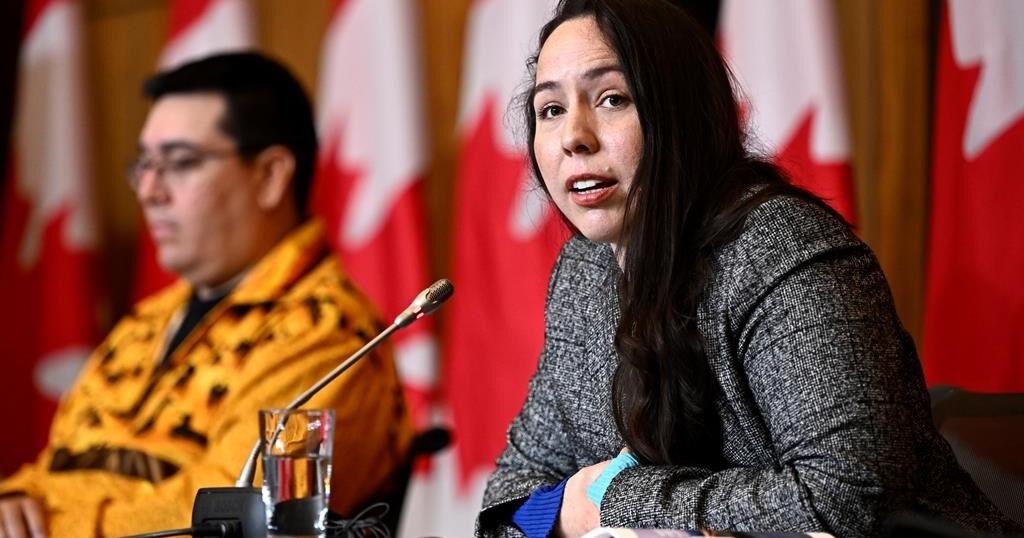OTTAWA – The Assembly of First Nations has postponed a special assembly for chiefs to vote on a landmark child welfare reform deal with Canada due to concerns about the process and a late translation of the document to French.
The Assembly was scheduled to be held in September in Winnipeg, but it will not happen now until October or November, the AFN said Tuesday.
“While many chiefs have told me they are eager to support the draft agreement next month, the AFN executive committee has agreed to provide more time for other chiefs to review the draft agreement,” National Chief Cindy Woodhouse Nepinak wrote in a letter.
“In the meantime, I am looking forward to meeting with more chiefs over the coming weeks to discuss the agreement, listen to your perspectives, and answer questions.”
Canada, the Assembly of First Nations, Chiefs of Ontario and Nishnawbe Aski Nation reached a $47.8-billion agreement in July to reform the First Nations child welfare system after decades of litigation that resulted in a finding that Canada discriminated against children on-reserve.
In recent weeks, chiefs and advocates have publicly raised concerns about some parts of the agreement, and the fact that a French-language version of the document was made available weeks later. The deal was reached on July 11 and distributed in English the next day, but a French-language version was only released on Aug. 12.
At least five of the AFN’s regional chiefs, including in British Columbia, Saskatchewan and Quebec-Labrador, called for the postponement.
Savanna McGregor, who serves as the grand chief of the Algonquin Anishinabeg Nation Tribal Council representing some First Nations in Quebec, had said Tuesday afternoon she was optimistic the meeting would be postponed in an effort to give chiefs more time to review the deal.
“All of our communities need to be given a fair chance to make a detailed analysis of the final agreement, and that takes time,” said McGregor.
“The subject matter at hand is too delicate.”
In a statement, Indigenous Services Canada spokesperson Anispiragas Piragasanathar said all documents published by Canada about this agreement were in both official languages, but the final agreement was published by the AFN.
“In the spirit of reconciliation, Canada should not and will not be telling First Nations organizations how to engage their own members,” he said.
“We will respect their self-determined process.”
In an interview Tuesday, Woodhouse Nepinak said it’s “unfair” for Canada to be blaming the AFN.
“That’s their languages,” she said. “I hope this document would be translated into all of our languages — it’s that important.”
Quebec-Labrador regional chief Ghislain Picard said the federal government has an obligation to ensure the document was translated, not the AFN.
“There’s an Official Languages Act that needs to be respected,” Picard said in an interview last week.
The Assembly of First Nations represents some 630 First Nations chiefs across Canada. Largely funded by Ottawa, the assembly helps with federal efforts to consult on legislation that could affect First Nations, and advocates on behalf of chiefs based on resolutions passed at their meetings.
McGregor said chiefs from Quebec and Labrador had an emergency meeting with Indigenous Services Minister Patty Hajdu and AFN National Chief Cindy Woodhouse Nepinak on Saturday.
The chiefs pushed for a delay of the vote until October.
The proposed deal is worth more than double what was originally promised for long-term reform in a settlement agreement that resulted from a human rights complaint over underfunding of child welfare services.
The federal government is responsible for child welfare on reserves, and provincial governments for child welfare programs everywhere else.
But Ottawa’s funding was only on par with the provinces when it came to foster care because they had to pay provincial agencies to provide that service at provincial rates. The Canadian Human Rights Tribunal ruled that Canada acted in a way that discriminated against on-reserve children.
Cindy Blackstock, who heads the First Nations Child and Family Caring Society and helped bring forward the initial complaint to the tribunal, has been raising concerns around some clauses in the agreement, including one that instructs the parties to publicly promote and defend it — something she says is not consultation.
She said while she is a “bit relieved” the vote has been postponed, she wants to see substantive changes in how consultations are being handled and some parts of how the agreement is structured.
“If it’s just delayed and the secrecy and kind of incomplete narrative about what’s in the agreement continues, and there’s no substantial amendments, those problems won’t be addressed,” she said.
Blackstock also said the AFN needs to disavow the clause that required them to promote the agreement to secure the endorsement of First Nations leadership, and needs to be able to provide leadership with “the straight goods.”
Asked if she would do so, Woodhouse Nepinak said “absolutely,” adding that it’s important for her to listen to chiefs and what they want.
Blackstock is also calling for a process for chiefs to put forward amendments and a protocol for negotiating them.
“It shouldn’t just be left to Canada,” she said.
Woodhouse Nepinak said she is open to that suggestion, and that they will be inviting Blackstock to address the assembly.
Jennifer Kozelj, spokesperson for Minister Hajdu, said in a statement the decision to move the vote rests solely with the AFN.
“The government of Canada will continue to support the parties in their work to engage partners on the historic $47-billion agreement to reform child and family services.”
The deal to reform First Nations child welfare has been the subject of lengthy and sometimes testy discussion among chiefs and advocates.
In June, three regional chiefs representing nearly half of First Nations accused the AFN in a letter of overstepping its mandate by making decisions that will directly affect children and families without consent, and saying it wouldn’t be transparent in negotiations for the settlement.
In a letter of response, Woodhouse Nepinak called a number of those claims inaccurate, and said while the chiefs may disagree with how negotiations have been unfolding, attacking employees and legal counsel “is not helpful.”
Two months after he signed that letter criticizing the process, Picard said “those concerns are still very much there.”
Woodhouse Nepinak said the assembly is working toward having chiefs being comfortable to sign on the dotted line, and that she “looks forward” to hearing from Picard.
“I’m going to Quebec this week,” she said.
“And I hope that we can work together in a good way.”
This report by The Canadian Press was first published Aug. 27, 2024.

























